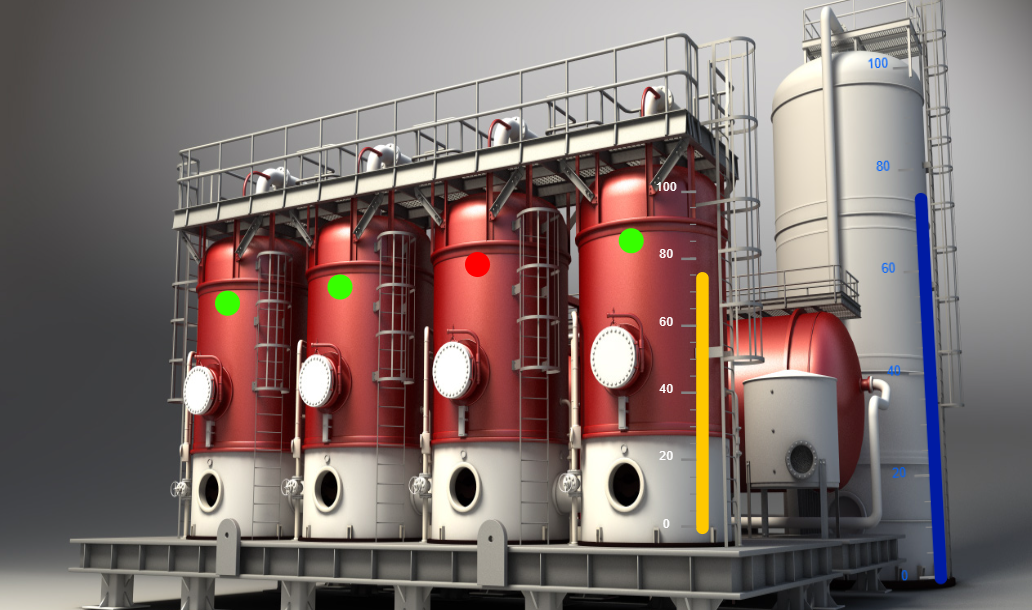What are alarms in SCADA?
In industrial control systems,
alarm management is crucial for maintaining smooth operations. A SCADA (Supervisory Control and Data Acquisition) system is designed to monitor and control various processes in industries like manufacturing, utilities, and energy.
What are alarms in SCADA? Alarms in SCADA systems are alerts that notify operators when specific variables fall outside of normal operational ranges. These alarms help identify potential issues before they escalate into significant problems. By notifying operators immediately, alarms play an essential role in safety, efficiency, and the prevention of equipment damage.

What is an alarm management system?
An alarm management system is a structured approach to managing alarms within a control system. It helps ensure that alarms are effective, not excessive, and provide actionable information to operators. The system prioritizes alarms based on their severity and provides appropriate responses, preventing alarm overload and ensuring that operators focus on critical issues. Alarm management systems aim to reduce nuisance alarms and maintain optimal performance in processes, ensuring smooth operations without overwhelming the control room with too many alerts.
What is ISA alarm management?
ISA alarm management refers to guidelines provided by the International Society of Automation (ISA). These guidelines, specifically ISA-18.2, offer a framework for the design, implementation, and operation of alarm systems. The goal is to create a system that alerts operators in a way that helps them respond effectively to process issues. By following ISA alarm management standards, companies can enhance safety and operational reliability, while reducing the risk of alarm fatigue among operators.

What is alarm management for process control?
Alarm management for process control is the practice of optimizing alarm systems to ensure they effectively support decision-making in process control environments. In these settings, alarms are crucial for operators to monitor parameters like pressure, temperature, and flow rates. Effective alarm management ensures that only meaningful alarms are generated, reducing the likelihood of ignoring critical events due to excessive alerts. This practice enhances both safety and efficiency, allowing for faster, more accurate responses to process deviations.
What is alarm management software?
Alarm management software is a tool used to monitor, analyze, and manage alarms within a control system. This software helps in tracking alarm events, logging responses, and maintaining historical records of alarm occurrences. The software is an integral part of alarm management systems, as it can provide insight into alarm trends, helping companies identify patterns of problematic alarms and make improvements. Additionally, SCADA alarm notification software can integrate with existing SCADA systems, ensuring that operators receive timely and clear notifications about critical alarms.
What are ISA 182 alarm management standards?
The ISA 182 alarm management standards are part of a series of guidelines that help organizations standardize alarm practices. These standards provide best practices for designing alarm systems that are not only reliable but also manageable and effective. The goal is to reduce alarm overload and ensure that alarms are meaningful and helpful in preventing potential issues. Adhering to these standards leads to safer operations, better decision-making, and improved system performance.
What is IEC 62682 Standards?
IEC 62682 standards focus on the design, operation, and maintenance of alarm systems in industrial control environments. These standards provide a framework for establishing clear and effective alarm strategies, similar to the ISA standards but with some specific focuses depending on the industry. The IEC 62682 guidelines aim to improve safety and operational performance by ensuring that alarm systems are properly designed and maintained, minimizing nuisance alarms and ensuring that critical alarms are appropriately addressed.

What is EEMUA alarm management?
EEMUA alarm management refers to the guidelines set by the Engineering Equipment and Materials Users Association (EEMUA) for managing alarms in control systems. The EEMUA standards emphasize the importance of ensuring that alarm systems are tailored to meet the specific needs of the facility and its operators. EEMUA alarm management provides recommendations for designing and maintaining alarms to enhance safety and reduce the risk of failures.
Conclusion
In summary, alarms in SCADA systems are essential tools for maintaining operational safety and efficiency. By adhering to industry standards like ISA alarm management or EEMUA alarm management, organizations can improve their alarm systems and reduce the risks of operator overload. To ensure that your alarm system is running effectively, consider investing in alarm management software and other solutions that optimize alarm logging and notifications.
If you're looking for reliable solutions to manage your alarms, check out our comprehensive services for Alarm Logging & Notification to ensure that your systems are always running smoothly, contact us today!
You might also like



